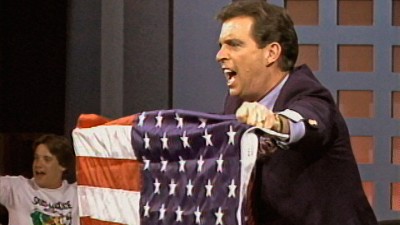| Reviews & Columns |
|
Reviews DVD TV on DVD Blu-ray 4K UHD International DVDs In Theaters Reviews by Studio Video Games Features Collector Series DVDs Easter Egg Database Interviews DVD Talk Radio Feature Articles Columns Anime Talk DVD Savant Horror DVDs The M.O.D. Squad Art House HD Talk Silent DVD
|
DVD Talk Forum |
|
|
| Resources |
|
DVD Price Search Customer Service #'s RCE Info Links |
|
Columns
|
|
|
Évocateur: The Morton Downey Jr. Movie

Reviewed at the 2012 Tribeca Film Festival
The Morton Downey Jr. Show was a pop culture phenomenon that rose and fell with equal expedition--it went on the air in New York in October 1987, went nationwide early the following year, and was cancelled in July of 1989. Within that brief but loud period in the spotlight, the show prompted endless hand-wringing and countless editorials: it was, people worried, an appeal to the viewing public's basest instincts, a show that celebrated the worst of human nature, a worrisome indication of where we were heading as a society. Ha ha, they might've been right; experiencing that circus for the first time since its heyday in the stimulating new documentary Évocateur: The Morton Downey Jr. Movie, it's impossible to see not only the DNA of Jerry Springer and Jersey Shore, but of O'Reilly, Hannity, Glenn Beck, and the rest.
The film, from directors Daniel Miller, Seth Kramer, and Jeremy Newberger, takes a good, hard look at the show, interviewing participants and producers, digging up miles of clips (from both on and off air), and sifting in those commentaries and news reports about the fall of civilization that was emanating out of that Secaucus, New Jersey studio. The clips still pack a punch--this was naked cruelty, a bellowing maniac blowing smoke and shouting invective, all within the persona of a chain-smoking America-first right-winger who'd had it up to here with "pablum-puking liberals" and various other "scum."
That persona, Évocateur suggests, may have been a construction; at the very least, it was a sharp contrast to the rest of his personal history, which is revealed in a nimble, non-linear fashion, folded in to the story of the show's ascent and tumble. Son of a famed crooner who tried to follow his old man's footsteps in pop music (the clips of his attempt at becoming a singing sensation are a hoot), Downey was a poet (!) and Kennedy liberal (!!) in the 1960s--even working in Senator Ted Kennedy's office. In the 1970s, he tried his hand at music again, this time in the guise of a soulful granola singer-songwriter. That didn't pan out, but his attempts to get on the radio led to on-air jobs, during which he began to play the part of the angry populist. It got ratings. It was show biz.
The television show finally made 55-year-old Downey the star he'd always longed to be, and he acted the part; announcing that "my audience finally selected a spokesman," he amped up the venom on the air and cranked up the bad behavior off-screen, where his ego, temper, and financial sloppiness spiraled out of control. It finally came to a head in a San Francisco airport bathroom, where Downey faked an attack by neo-Nazis as a publicity stunt for his sinking show and forthcoming pop album. (Telltale sign that it was a hoax: the swastika they'd scrawled on him with magic marker was backwards--y'know, like if you drew it on in the mirror.)
That incident, and other stories told by those close to him, are illustrated with inventive animations; that's one of many touches the filmmakers use to shake up the standard clips-and-interviews bio-doc format. Also clever: having fan Chris Elliot and rival Sally Jesse Raphael do a dramatic reading of one of Morton's '60s poems, as ironic counterpoint to his meteoric rise. But some of their other weirdo excesses--like going to a club with the one-off footnote character of a busty stripper guest, and watching her gyrate awkwardly on the dance floor--just sit on the screen.
There are also some strange exclusions from the story--most notably the tale of Downey's gay, HIV-positive brother Tony, whom Downey had come out on his show. The story of that begrudging acceptance and display of familial compassion would make an interesting counterpoint to his gay-baiting, which came to a head with an alleged assault, on the show, of gay activist Andrew Humm. He was acquitted of the charges, the segment never aired, and none of that is in the film either.
Still, if those omissions are puzzling, there is plenty of riveting stuff here: the shouting matches with Ron Paul and Lyndon LaRouche, the appearances by on-the-rise Al Sharpton (including a tape of him calling an antagonist "faggot," which I'll bet Reverend Al would rather wasn't still knocking round), the clips from the later, freak-show days, when they could no longer book legitimate guests. And the analogies to current political commentators and activists, while far from subtle, are biting and concise. The Morton Downey Jr. may have lasted less than two years, but it is still all over our political and media landscape, and Évocateur: The Morton Downey Jr. Movie offers a probing look at a fascinatingly prescient point in our cultural (de)evolution.
Jason lives in New York. He holds an MA in Cultural Reporting and Criticism from NYU.
|
| Popular Reviews |
| Sponsored Links |
|
|
| Sponsored Links |
|
|
| Release List | Reviews | Shop | Newsletter | Forum | DVD Giveaways | Blu-Ray | Advertise |
|
Copyright 2024 DVDTalk.com All Rights Reserved. Legal Info, Privacy Policy, Terms of Use,
Manage Preferences,
Your Privacy Choices | |||||||











